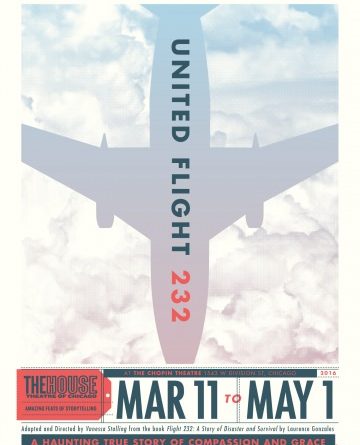United Flight 232
Adapted and Directed by Vanessa Stalling
Based on the Book by Laurence Gonzales
Produced by The House Theatre of Chicago
Theatre to Restore Your Faith in People
It’s obvious why the story of United Flight 232 would be so appealing to theatre practitioners. The 1989 controlled airplane crash was unusual for having both a large number of fatalities and survivors, and that anyone survived at all is due to the remarkable courage and training of the crew and many passengers. But how to tell it in a theatrical form? Adaptor and director Vanessa Stalling cleverly devised an ensemble-based piece of story theatre (think TimeLine’s Spill, if you saw it) which, like her source material, the book by Laurence Gonzales, allows the survivors to speak directly to us. The result is not only deeply moving, but also exciting and beautifully produced.
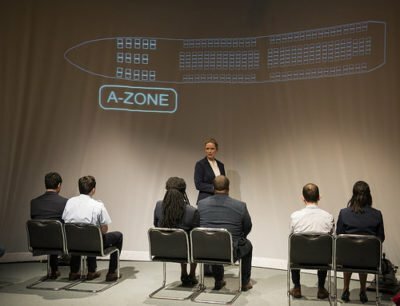
As usual with The House, United Flight 232 has a striking and evocative design. Upon entering the theatre, we travel down a jet bridge and emerge into the Chopin’s upstairs space, which has been stripped of most of its seating by scenic designer John Musial and surrounded by a beige tarp. The abstract suggestion of the airplane is demonstrative of Stalling’s concept, which is to make the words of the survivors the only thing specific to them in the play. Delia Ridenour’s costumes for the nine actors are formal blue suits which could belong to either crew or passengers, since most of the actors switch characters frequently. And though numerous sensational recordings from the crash exist (news crews were able to get to the Sioux City airport in time to video it), projection designer Paul Deziel forgoes using them, in favor of impersonal mechanical drawings.
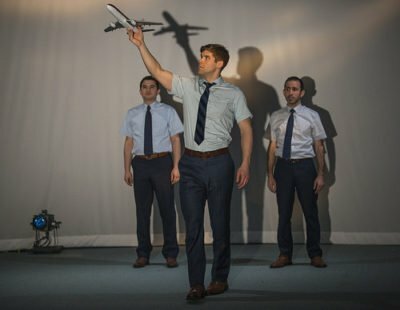
We are introduced to the plane by Brenda Barrie as Jan Brown Lohr, the chief flight attendant. She’s all-business, and has a reputation among the crew, played by Alice Da Cunha and Echaka Agba, for being as much a stickler for the smallest details of hospitality as for safety. Our minds are immediately drawn to how paternalistic the power dynamic is between crew and passengers. Most of the time, flight attendants behave like waitresses, passing out juice and apologetically soothing customers. But they have legal authority over passengers, and are responsible for them in life-threatening situations. We also meet the cabin crew (Rudy Galvin, James Doherty, Johnny Arena, and Kroydell Galima), for whom this Denver-to-Chicago flight was going fine until an engine blew. Even that’s not always a disaster, but then they realize they have lost control of most of the plane’s functions.
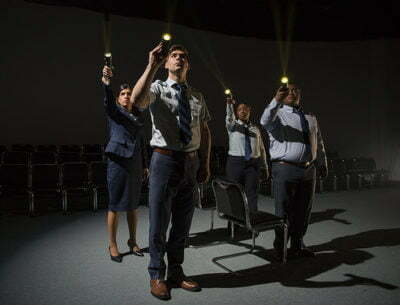
It would later turn out that when part of the engine exploded, shrapnel severed all the hydraulic fluid cables, which is why the flight control surfaces became unresponsive. Quick improvisation by the pilots prevented the plane from flipping over, but they still had to inform Lohr that, unable to properly steer, a crash was inevitable. Passengers report knowing something was very wrong as soon as they saw Lohr emerge ashen-faced from the cockpit, but the crew tried to maintain a sense of normalcy, even while instructing passengers on how to brace for impact. Elana Elyce and Michael Martin round out the cast, joining the others in playing several different passengers who bonded with each other and tried to mentally prepare themselves for death. The pilots hope to save as many people onboard as possible, but their primary goal was to not cause any damage to the people on the ground.
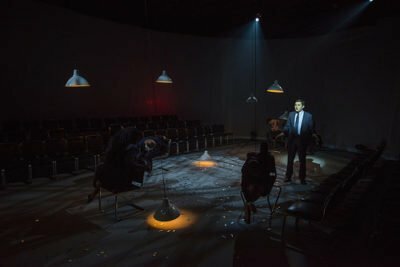 Though we get only brief glimpses of most of the characters, the sum of their reactions leaves an indelible impression. Due to a promotional program, United Airline had an unusually high number of unaccompanied minors on that fight, and many strangers took it upon themselves to comfort or attempt to rescue children. But there were also a number of people who couldn’t help freezing up, and it was the crew and passengers who happened to have military training who got their fellows to snap back while fire roared through the fuselage. Stalling’s past-tense narrative makes clear who survives, but by making us concerned for the injuries of the characters we come to know in such a short time, she was able to raise the tension to the point where we feel we are in the crises. Truly inspired lighting choices by William C. Kirkham help here, as, of course, does the commitment of the actors to the extremes the people onboard felt. Agba is particularly effective as a flight attendant remembering a passenger who didn’t make it.
Though we get only brief glimpses of most of the characters, the sum of their reactions leaves an indelible impression. Due to a promotional program, United Airline had an unusually high number of unaccompanied minors on that fight, and many strangers took it upon themselves to comfort or attempt to rescue children. But there were also a number of people who couldn’t help freezing up, and it was the crew and passengers who happened to have military training who got their fellows to snap back while fire roared through the fuselage. Stalling’s past-tense narrative makes clear who survives, but by making us concerned for the injuries of the characters we come to know in such a short time, she was able to raise the tension to the point where we feel we are in the crises. Truly inspired lighting choices by William C. Kirkham help here, as, of course, does the commitment of the actors to the extremes the people onboard felt. Agba is particularly effective as a flight attendant remembering a passenger who didn’t make it.
The show does not shy away from the number of people killed, but its recounting of heroism and, in its own words, compassion and grace, works so well because it is so truthful. It’s nice to be reminded that in a crises situation, most of the strangers around you, such as the other audience members, will try to help. United Flight 232 communicates an uplifting message in a manner which resonates because it is told so convincingly, and in such a way that we feel its consequences.
Highly Recommended
Jacob Davis
This show has been Jeff Recommended.
Playing at the Chopin Theatre, 1543 W Division St, Chicago. Tickets are $30-35; to order, call 773-769-3832 or visit thehousetheatre.com. Performances are Thursdays-Saturdays at 8:00 pm and Sunday at 7:00 pm through May 1. Running time is eighty-five minutes with no intermission.

